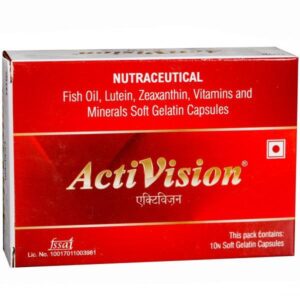VITAMIN AND MINERAL SUPPLEMENT + LUTEIN
Vitamin And Mineral Supplement: Vitamin and Mineral Supplement is a dietary supplement that is typically used to fill nutritional gaps and support overall health. It is usually taken to ensure adequate intake of essential vitamins and minerals that may be lacking in an individual’s diet.
The mechanism of action of this supplement is based on the principle that vitamins and minerals are essential nutrients required for various physiological processes in the body. They play crucial roles in supporting the immune system, maintaining proper functioning of organs, promoting energy production, aiding in enzyme reactions, and supporting overall well-being.
The specific dose of Vitamin and Mineral Supplement can vary depending on the brand and formulation. It is important to follow the dosage instructions provided on the product packaging or as recommended by a healthcare professional. Generally, these supplements are intended to be taken orally, usually with a meal to enhance absorption.
Side effects of Vitamin and Mineral Supplement are typically rare when taken within the recommended dosage range. However, some individuals may experience mild gastrointestinal discomfort, such as nausea, vomiting, or diarrhea. In rare cases, an allergic reaction to certain ingredients in the supplement may occur, leading to symptoms such as rash, itching, or swelling.
It is important to note that taking excessive amounts of certain vitamins and minerals can lead to toxicity symptoms. Therefore, it is advisable to avoid exceeding the recommended dosage or combining multiple supplements without consulting a healthcare professional.
Individuals with pre-existing medical conditions, pregnant or breastfeeding women, and those taking medications should consult their healthcare provider before starting any new dietary supplement.
Lutein: Lutein is a naturally occurring carotenoid that is found in high concentrations in the macula of the human eye. It is a yellow pigment that is responsible for the yellow color of the macula and zeaxanthin, another carotenoid, is the other major specific pigment in this area. Lutein is not produced by the body, so it must be obtained through diet or supplementation.
Lutein is primarily used as a nutritional supplement to support eye health. It is commonly taken to reduce the risk of age-related macular degeneration (AMD), a condition that leads to the gradual loss of central vision. Lutein supplementation may also benefit people with cataracts, retinitis pigmentosa, and other eye conditions.
The exact mechanism of action of lutein in supporting eye health is not fully understood. However, it is believed to function as a powerful antioxidant that helps to protect the eyes from damage caused by harmful free radicals. Lutein may also help to filter out high-energy blue light that can be damaging to the retina.
The recommended dose of lutein varies depending on the specific health condition being targeted. For general eye health, a dosage of 10-20 mg per day is commonly recommended. Higher doses may be recommended for individuals with existing eye conditions. It is important to consult with a healthcare professional to determine the appropriate dosage for each individual.
Lutein is generally considered safe for most individuals when taken in recommended doses. However, some side effects have been reported, although they are rare. These side effects might include yellowing of the skin (due to the yellow color of lutein), gastrointestinal disturbances, and allergic reactions. If any unusual or severe side effects occur, it is important to seek medical attention.
It is worth noting that lutein is a dietary supplement and is not a substitute for a healthy diet or a substitute for the treatment of specific eye conditions. It is always recommended to consult with a healthcare professional before starting any new supplementation regimen.

